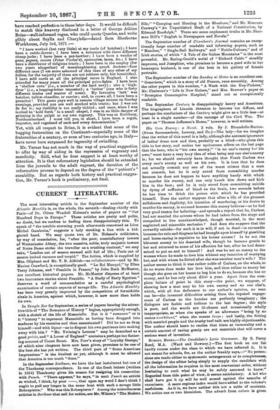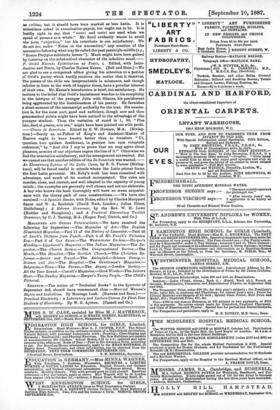Sermon Boons.—The Candidate's Latin Grammar. By S. Percy Reed, M.A.
(Ward and Downey.)—The first book on our list hardly comes under the class to which we have referred it. It is not meant for schools, for, as the author frankly says,—" No preten. alone are made either to systematic arrangement or to completeness, the design of the editor being simply to supply the candidate with all the information he requires in the most convenient order, without hesitating to omit what he may be safely assumed to know." Regarded from this point of view, it seems satisfactory. A lad who shall have got it up will be well armed againd the assaults of examiners. A. more copious index would have added to the volume's swefalness. As it is, we have neither this nor a table of contents. Wo notice one or two blemishes. The adverb from relate is given
as ccelitus, but it should have been marked as late Latin. It is sometimes asked in examination-papers, but ought not to be. It is hardly right to say that " nostri and vestry are used when we speak of persons as a whole." Mr. Reed evidently wants to avoid the term "objective," but his Enbatitnte is not satisfactory. We do not see, under " Notes on the Accusative," any mention of the accusative following what may be called the peat participle middle (e.g., "Rostro Phrygiossubionota looses"). Much might have been gained by insisting on the substantival character of the infinitive mood.— P. Ooidii Nasonis Epistolarum ex Ponto, i. Edited, with Intro- duction and Notes, by Charles Haines Keene. (Bell and Sons.)—We are glad to see a competent editor giving his attention to a portion of Ovid's poetry which hardly receives the notice that it deserves. The poems of the exile are irreproachable in substance, and though inferior in form to the work of happier times, have a peculiar interest of their own. Mr. Keene'e introduction is brief, but satisfactory. He inclines to the belief that Ovid's banishment was doe to his complicity in the intrigue of the younger Julia with Silanus, his punishment being aggravated by the licentiousness of his poetry. He furnishes a short account of the manuscript authority for the text. His annota- tion is, for the most part, good and sufficient, though' now and then grammatical points might have been noticed to the advantage of the younger student. Thus, the variation of mood in i., 80, "Plus into, dud, si precer, oris ero," might have been pointed out with profit. —Cicero de Senectute. Edited by E. W. Howson, M.A. (Riving- tons.)—Surely an ex-Fellow of King's and Assistant-Master of Harrow ought to have known better than to translate "IIt, quoniam hap° quidam deaiderant, in gratiam iam cam voluptate redeamus," by "And this I say to prove that we may agree about pleasure, as some of our objectors regret the loss of it." Otherwise we find the annotation satisfactory, and the arrangement convenient. But we cannot see that another edition of the De Senectute was wanted.— An Elementary Syntax of the Latin Cases, by B. D. Turner (Riving- tons), will be found useful in schools where the Latin primer forms the first Latin grammar. Mr. Roby's work has been consulted with advantage, and much of its method incorporated. The roles are concise, clear, and eorrect, and well adapted to the capacity of young minds ; the examples are generally well chosen and not too elaborate. A boy who knows the book thoroughly will have no mean acquaint- ance with the thorny path of case contractions.—We have also received :—A Spanish Reader, with Notes, edited by Charles Marquard Saner and W. A. Roebrich (David Nett, London ; Julius Green, Heidelberg) ; A Hebrew Grammar, by the Rev. W. H. Lowe (Hodder and Stoughton) ; and A Practical Elementary Turkish Grammar, by C. J. Tarring, M.A. (Regan Paul, Trench, and Co.)



































 Previous page
Previous page